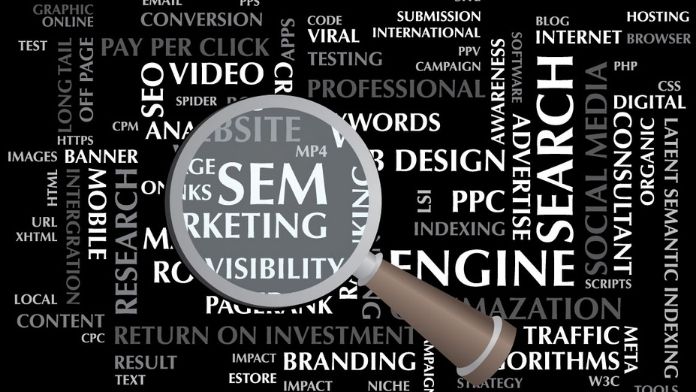It’s critical to keep ahead of the curve in the ever-changing field of digital marketing. One term that has gained significant importance in recent years is SEM, which stands for Search Engine Marketing.
This powerful tool is a game-changer for businesses looking to expand their online presence, drive traffic, and boost their sales. We will go further into the realm of SEM in this post, covering its definition, elements, tactics, and much more.
In the digital landscape, SEM is the buzzword every marketer should be familiar with. SEM marketing meaning is a potent tool that helps businesses maximize their online reach and connect with potential customers.
SEM Meaning

Search engine marketing (SEM) seeks to increase a website’s exposure in search engine results pages (SERPs) through paid advertising. Pay-per-click (PPC) advertising is the main tactic wherein marketers bid on keywords relevant to their industry. The advertisements appear at the top or bottom of the search results when visitors type in certain terms.
Because marketers may target specific audiences based on demographics, geography, and other variables, SEM offers a focused approach. SMM in digital marketing accuracy contributes to optimizing return on investment (ROI). The most often used platforms for SEM campaigns are Google Ads and Bing Ads.
SEM is a versatile tool for businesses looking to increase online visibility, draw in visitors, and generate leads or sales. It is an adjunct to search engine optimization (SEO), concerned with naturally occurring (unpaid) search results. By successfully reaching their target audience, SEO and SEM together assist firms in achieving their digital marketing objectives.
What is SEM in Digital Marketing
SEM, or Search Engine Marketing, is a crucial aspect of digital marketing that revolves around paid advertising efforts on search engines. It involves strategies like pay-per-click (PPC) advertising to increase website visibility, attract targeted traffic, and drive conversions effectively, thereby maximizing online presence and business success.
The Components Of SEM

Search engine marketing (SEM) aims to use various strategies to boost a website’s visibility in search engine results.
Keyword research is the first step in SEM. It’s crucial to pick keywords that apply to your business.
Marketing Campaigns:
One of the main elements of SEM is pay-per-click (PPC) advertising. An ad campaign creates and modifies advertising to appear when certain keywords are searched.
Ad Extensions:
These enlarge your ad by adding details, such as a map, a phone number, or connections to other websites.
Quality Score:
Search engines employ quality ratings to rank advertisements. The landing page quality, click-through rate, and ad relevancy determine these ratings.
Bidding Techniques:
Bidding strategies—making bids manually or automatically—are critical to effectively managing your budget.
Landing Pages:
Users should arrive at a relevant and interesting page after clicking an advertisement.
Analytics:
Monitoring and assessing the effectiveness of campaigns is essential. Google Analytics and other similar tools provide information to improve SEM operations.
Improved internet exposure, greater conversion rates, and more website traffic may result from skillfully integrating these elements.
Paid Search Advertising

Advertisers using Paid Search Advertising, or Pay-Per-Click (PPC) advertising, are charged a charge each time their search engine advertisement is clicked, such as Google or Bing. Search engine marketing meaning technique provides a very focused and quantifiable strategy to increase website traffic and conversions.
Targeted keywords relevant to the product or service being marketed are often utilised when developing ad campaigns for paid search advertising. When a user’s query matches certain phrases, the advertising is shown prominently on the search engine results page, increasing exposure to potential customers. The price per click fluctuates based on how competitive the keywords are.
Paid search advertising guarantees an economical and successful approach to reaching a specific audience. Due to its adaptability and potential for quick results, it is an essential part of web marketing plans for companies of all sizes. Businesses can monitor results, manage budgets, and adjust real-time strategy with Paid Search Advertising.
Organic Search Optimization

Organic search optimization, often known as SEO (search engine optimization), is an essential digital marketing tactic that aims to improve a website’s visibility and rating on search engine results pages (SERPs) without needing paid advertising.
This process uses some on-page and off-page strategies to increase a website’s authority and relevance in search engines’ eyes, such as Google.
Effective organic search optimization includes several components: user experience enhancements, technical SEO, link-building, content optimization, and keyword analysis. By creating excellent content, optimizing for important keywords, and ensuring the website is technically sound, SEO aims to enhance organic (non-paid) traffic.
In addition to increasing a website’s exposure, organic search optimization improves its user experience, reputation, and reliability. Because of this, it is an essential part of any effective online presence, assisting companies and people in reaching their target market and achieving their online objectives.
Keyword Research
A key element of digital marketing and SEM (search engine marketing) tactics is keyword research. While search engine marketing (SEM) is discussed, it involves identifying and selecting keywords or phrases that potential customers will likely use while searching the Internet for products or services.
These keywords are thoughtfully included in digital marketing strategies like pay-per-click (PPC) advertising and search engine optimization (SEO) to improve a website’s exposure in search engine results.
SEM vs SEO can target the keyword “SEM digital marketing meaning” in a campaign.
Marketers employ various tools to find appropriate keywords to evaluate user intent, search traffic, and competition. SEM, the full form of digital marketing, allows them to do efficient keyword research. To ensure that the chosen keywords provide relevant visitors to a website, it is important to strike a balance between high search volume and little competition.
Ad Campaign Creation
We are glad to offer our state-of-the-art Ad Campaign Creation service, which aims to significantly raise engagement and brand exposure. Our talented team of marketing strategists is committed to producing advertisements that captivate your target audience and provide exceptional results.
Every campaign is tailored to your unique business goals, prioritizing creativity and data-driven insights. To optimize your return on investment, we carefully choose the best channels, including social media, search engines, and display advertising.
We ensure that every component, from captivating ad writing to attention-grabbing graphics, connects with your target demographic. Thanks to our detailed monitoring and optimization procedure, your money will be used wisely, increasing conversions and fostering brand loyalty.
Become one of the many pleased customers who have used our Ad Campaign Creation service to see their companies grow. Reach out to us now; together, we can take your brand to new heights!
Budgeting And Bidding

Effective management of online advertising campaigns in digital marketing requires budgeting and bidding in SEM (Search Engine Marketing). Paid search advertising is included in SEM and is mostly done via Google Ads platforms.
Budgeting entails allocating a certain amount for your search engine marketing activities. This budget helps you avoid going overboard by dictating how much you’re prepared to spend on advertising over a certain time frame.
Conversely, bidding determines how much you’re prepared to spend for each click on your adverts (CPC) or other desired action (CPA). By selecting the appropriate audience to target and maximizing ad placements, effective bidding tactics enable you to get the most out of your money.
To achieve your marketing goals—like increasing website traffic, lead generation, or sales— SEM digital marketing is thus all about striking the correct balance between your budget and bidding strategy. An effective SEM strategy requires careful handling of both components.
Ad Extensions
Digital marketing initiatives centred on Search Engine Marketing (SEM) must include Ad Extensions. Search engine marketing (SEM) uses paid advertising to increase a website’s visibility on search engines like Google. Ad extensions enlarge the main advertisement text, giving customers more information and reasons to click.
These extensions may appear in various styles, including callouts, site links, and structured snippets. Sitelinks make it simpler for visitors to browse your website by providing extra links to certain pages.
Structured snippets classify your goods or services, while callout extensions draw attention to your main selling factors. Call extensions let people contact you directly, while location extensions show your company’s address.
Ad extensions boost your ad’s overall relevancy and click-through rates and increase ad real estate, all of which have a favourable effect on your Quality Score. By making good use of ad extensions, SEM digital marketing strategies may greatly increase the effectiveness and exposure of your online ads.
Monitoring And Analytics
Ad Extensions are vital components of Search Engine Marketing (SEM) digital marketing campaigns. SEM involves using paid advertising to enhance a website’s visibility on search engines like Google. Ad Extensions expand the basic ad text, giving users more information and reasons to click.
These extensions come in various formats, such as site links, callouts, structured snippets, etc. Sitelinks offer additional links to specific pages on your website, making navigating easier for users. Callout extensions highlight key selling points, while structured snippets categorize your products or services.
Location extensions display your business address, and call extensions allow users to contact you directly.
Ad Extensions not only increase ad real estate but also improve click-through rates and the overall relevance of your ad, positively impacting your Quality Score. By utilizing Ad Extensions effectively, SEM digital marketing campaigns can significantly enhance the success and visibility of your online advertisements.
SEM Tools And Software
The phrase “search engine marketing” (SEM) refers to a digital marketing approach that uses paid advertising to raise a website’s exposure in search engine results pages (SERPs). SEM software and solutions are essential for managing and improving SEM campaigns.
These tools include several functions, such as keyword research, performance data, bid management, and ad generation. Google Ads, Microsoft Advertising, SEMrush, and Moz are well-known SEM tools.
For example, Google Advertisements provides a feature-rich platform for setting up and maintaining pay-per-click (PPC) campaigns. It allows companies to place bids on specific keywords and show advertisements in Google search results.
SEM software is crucial for companies looking to expand their online reach and increase website traffic since it makes monitoring, evaluating, and optimizing advertising campaigns more efficient and yields higher returns.
Meaning Of SEM Digital Marketing
Search engine marketing (SEM) is a digital marketing strategy that increases a website’s visibility in search engine results using paid advertising. Using search engine marketing (SEM), paid search ads—typically pay-per-click (PPC) advertising—are shown at the top of search results for certain keywords.
It aims to attract relevant visitors, generate leads, and increase brand recognition. Search engine marketing (SEM) complements search engine optimization (SEO), which tries to raise organic search rankings.
Strategic search engine marketing (SEM) is essential to an all-encompassing digital marketing plan since it gives companies instant exposure and access to a larger online audience.
Procrastination:
Postponing work might result in tension and lost chances.
Ineffective Communication:
Misunderstandings and disputes may arise from a failure to communicate ideas effectively.
Neglecting Health:
Ignoring one’s physical and mental well-being might harm one’s long-term success.
Overcommitting:
Taking on excessive labour might result in fatigue and subpar output.
Absence Of Planning:
Unfocused activities might arise from a failure to establish objectives and create a strategy.
Ignoring Feedback:
It could be necessary to better one’s growth by rejecting other people’s suggestions.
Ignoring Finances:
Unskillful money handling might result in financial difficulties.
Keeping Grudges:
Relationships and inner serenity may suffer from unresolved disputes.
Ignoring Self-Care:
Ignoring leisure activities and hobbies impacts happiness in general. A fear of failing might impede one’s personal and professional progress.
SEM Success Stories
Using Search Engine Marketing (SEM) has produced amazing outcomes for many firms. Consider a modest e-commerce business that increased its web presence dramatically via well-planned SEM ads. Their revenue increased by 150% in just six months due to improved keywords and targeted advertisements.
A local clinic employed social media marketing (SEM) to build relationships with patients from low-income backgrounds. By optimizing its advertising strategies, the clinic boosted appointment reservations by 60% and enhanced community access to healthcare.
A tech business also used SEM to launch a ground-breaking product. Their well-designed marketing plan caused a 200% rise in product sales, which put them at the top of the industry.
These SEM success stories highlight the game-changing potential of SEM and demonstrate that companies of all sizes can achieve extraordinary development with the correct strategy.
Conclusion
In conclusion, search engine marketing, or SEM, is essential to digital marketing. It includes techniques like search engine optimization and pay-per-click advertising to improve a brand’s online presence and successfully reach its target audience.
SEM uses search engines like Google to improve online content and insert adverts to rank better in search results. It makes it possible for companies to get in touch with prospective clients just when they’re looking for certain goods or services.
In the constantly changing digital world, organizations may increase their online presence, attract traffic, and eventually accomplish their marketing objectives by using SEM.
FAQ
What Is The Main Difference Between SEM And SEO?
SEM involves paid advertising to increase a website’s visibility, while SEO focuses on organic, non-paid methods to achieve the same goal.
How Do I Choose The Right Keywords For My SEM Campaign?
Keyword research is key. Find out which terms your target market uses to search for your products or services.
Is SEM Suitable For All Types Of Businesses?
SEM can benefit a wide range of businesses. However, its efficacy could differ according to industry and competition.
What Are Some Common Mistakes To Avoid In SEM?
Avoid common mistakes like neglecting keyword research, setting unrealistic budgets, and failing to track and analyze results.
Can I Run An SEM Campaign On A Limited Budget?
Running an SEM campaign on a limited budget is possible by carefully managing your bidding and targeting strategies.



